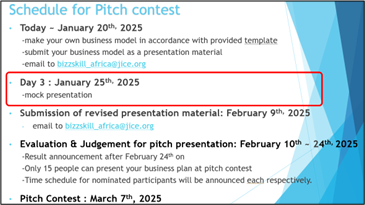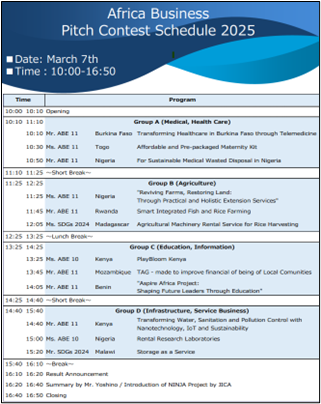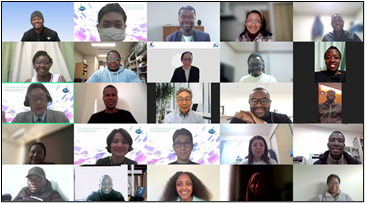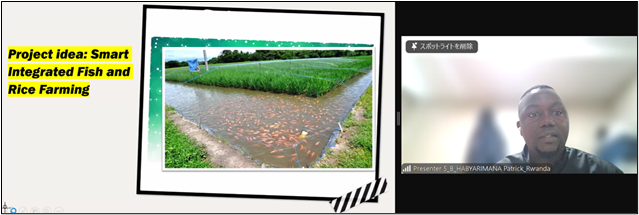Launching a new business to solve problems in our own country: Business skills training was held.
2025.04.08
A business skills training course and a business plan presentation session aimed at solving development issues in their home countries were held for ABE Initiative (hereinafter, ABE Initiative) and SDGs Global Leader Program (hereinafter, SDGs-GL) participants.
The final goal of the program was for the JICA participants to identify issues facing their home countries in advance and use the skills and methods they learned in the training course to draw up a business plan to solve the issues in their home countries.
In the training, participants acquired and practiced basic knowledge on general marketing theory, various analytical methods, and the components of business models, and learned the skills essential for drawing up a business plan. In the presentation session on the final day of the training course, twelve pre-selected business plans were presented, highlighting the seriousness of the issues and the effectiveness of the solutions, while appealing for the high value of the business. In the future, the participants will aim to realize their business plans while also exploring collaboration with Japanese companies and organizations.
The training course was held online over four days and covered the following topics:
Days 1 and 2: Lectures of business skills and methods
Day 3: Exercises for business plan presentation
Day 4: Business plan presentation session (Pitch Contest)
The training was held over two days, December 14th and 15th, 2024, and participants learned the skills and methods that are essential for drawing up a business plan through online training.

(Fig. 1: A method for defining the business field to target during a market strategy lecture)

(Fig. 2: An exercise to learn Jobs-to-be-Done (JTBD), a method for defining the value, a customer wants to achieve)

(Fig. 3: Framework template for visualizing and understanding business models)
Participants used the skills and methods they learned on the first and second days to draw up a business plan to solve the problems in their own countries and submitted it in advance before the Day 3 training. This time, 58 people submitted a business plan, indicating that many JICA participants recognize the social issues in their own countries as business opportunities.
On January 25, 2025, the training lecturer selected proposals that could serve as model cases from the business plans, submitted in advance and held an exercise in presentation of the proposals. By receiving evaluations and opinions from training lecturers and other participants on the content of the business plans themselves, such as the business content and analysis methods, and the way the presenters presented them, the plans were improved to be more appealing and persuasive.

(Fig. 4: Schedule until the announcement of the business plan)

(Fig. 5: Explaining the essential elements of a presentation)

(Fig. 6: Presentation techniques that impress people)
At the session for business plan presentation on March 7, 2025, the final day of the training course, a pitch contest was held among the 12 presenters who had submitted excellent business plans, and they presented their business plans to a panel of judges including the training lecturer, Mr. Kenya Yoshino, and Mr. Shohei Yoshimitsu of Yamaha Motor Co., Ltd. In addition to the presenters, 70 JICA participants and 22 audiences from companies and organizations also participated in the pitch contest, showing a high level of interest in the presenters to solve issues in their own countries.

(Fig. 7: Twelve business plans presented at the pitch contest)

(Fig. 8: Group photo at pitch contest)
The 12 presenters worked hard to improve their business plans until the very end. All of the presentations were excellent and difficult to rank, but in the end, the following three proposals were selected as outstanding.

Best Presentation
Mr. OBI Kelechi (Nigeria) “For Sustainable Medical Wasted Disposal in Nigeria “

Good Presentation
Mr. Habyarimana Patrick (Rwanda) “Smart Integrated Fish and Rice Farming “

Good Presentation
Mr. Nzyoki Kimanthi (Kenya)
“Transforming Water, Sanitation, and Pollution Control with Nanotechnology, IoT, and Sustainability”
Obi Kelechi, who was selected as the best presentation, said, "I feel very honored. Through this training, I was able to learn the perspectives necessary for expanding business into Africa and how to approach Japanese companies for that purpose. Going forward, I would like to further expand my network with Japanese companies aiming to start venture businesses in Africa and continue to work hard to realize my proposed 'medical waste treatment business.'"
It is expected that the JICA participants who joined the training will deepen their understanding of the skills and ideas they learned. By mean of fully utilizing them, they are expected to further improve their own business plans to solve issues in their own countries while collaborating with Japanese companies and organizations. JICA wish them to become active as bridges between Japan and Africa in the future.
<
Scoped Programs
>
African Business Education Initiative for Youth (ABE Initiative):
A program that provides African youth with the opportunity to obtain a master's degree at a Japanese university and do internships at Japanese companies, etc., with the aim of cultivating African industrial and business human resources who can serve as a bridge between Japan and Africa.
[Number of JICA participants, participating during training course]
Days 1 and 2 training: 75 people:
Day 3 training: 60 people
Business plan submitters: 58 people
Day 4 training (Pitch Contest): (12 presenters + auditors) 82 people
scroll